Laura Gallaher
November 30, 2018
Laura Gallaher launched her career as an organizational psychologist by working with a team to change the organizational culture at NASA. Since then, she has been working with organizations big and small to help Type A, driven managers find their blind spots, open the lines of communication with their teams, and create a culture of vulnerability worth fighting for. At the same time, her own life is one filled with reflection and travel. Have I mentioned that she’s currently on a mission to live in a different country each month for a year? Yeah, she’s a rockstar. Read on to find out how to ask the right questions to get the right results regardless of whether you’re part of a team of two or 200.
Do you remember where you were when the Columbia Space Shuttle disaster happened in early 2003? I do. I am old enough to remember the Challenger disaster in the 80s as well, but this one felt different because I processed it from an adult perspective. During Columbia, I was living in the same place I was when 9/11 happened. Those events were not too far apart, so I recall initially being concerned that it possibly could be terrorism-related.
After Columbia, NASA Kennedy Space Center worked to create a culture where all voices were heard so that better decision-making could happen. Laura Gallaher was a part of the team that was tasked with changing this culture within NASA and better educating the organization on why organizational development was the key. What a place to launch your career, right?
Ok, now let’s fast forward to late 2018 …
Laura is currently the CEO of her company Gallaher Edge (previously known as Key Talent Solutions). Her team works with corporate clients to push them to be the best versions of themselves. My company, Blezoo, hired Laura last year to further develop our values and to equip us with a common language to communicate effectively. It has changed our culture, the way we hire, how we conduct meetings, and how we communicate.
For me, personally, it was the first time that I hired a coach. As soon as I was able to become aware of my defensiveness, I benefited greatly! I highly suggest it, but now back to our intro …
I don’t think Laura has an off switch because she’s always asking questions, processing, and following up. She’s clearly passionate about her profession and helping others 24/7 (which is why I couldn’t wait to ask her a question about that specific topic). Her focus is strictly on the other person and she will often pause after listening to you talk for a long time before saying, “Here is what I’m seeing,” and will then proceed to clearly state what is going on in a simple way that you hadn’t been able to articulate. She’s a rockstar and I hope you learn a few valuable things from this interview as I did!
[Setting: We were fortunate to link up at my office. Laura was speaking at TEDx Orlando the next day and had come into town from South America where she was currently living – more on that tidbit below.]
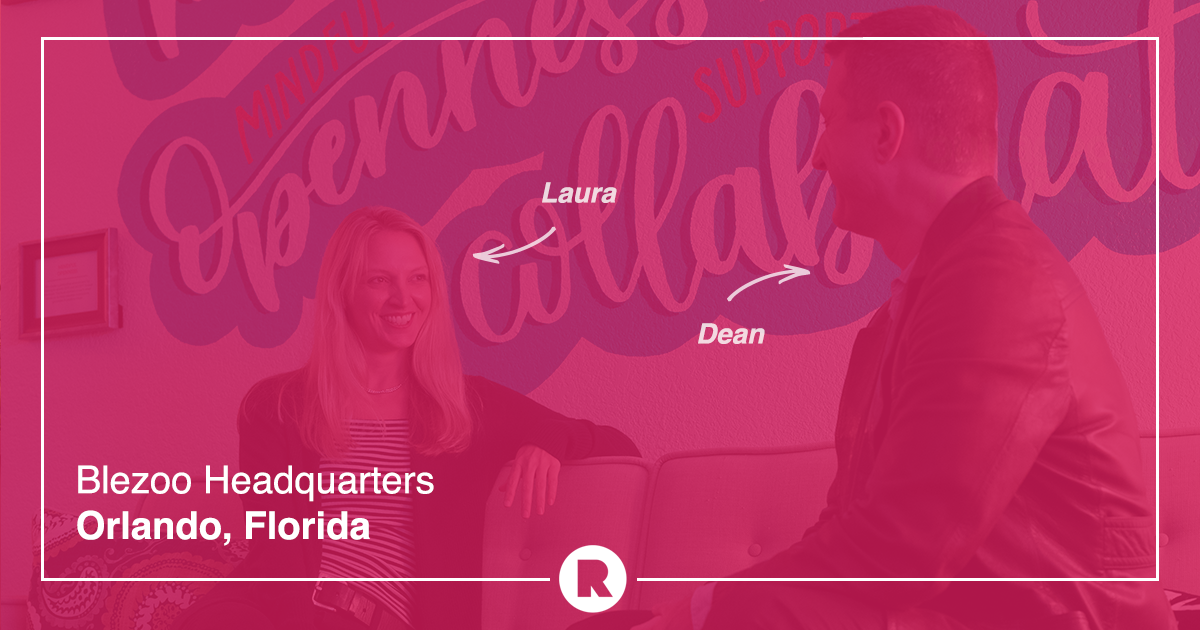
Dean: I know what you do, but [I wanted to know] when you meet somebody new, let’s say it’s a friend of a friend, somebody you have some genuine interest for that you just met, and they ask you while on a really long elevator ride, “What do you do?” What do you tell them?
Laura: I’d say something along the lines of, you know when you find yourself avoiding conversations and yet you’re obsessed with trying to make things better? So, you get really stuck in your head with self-talk and that doesn’t solve the problems. Then, you start talking to other people about it, but that doesn’t solve the problem either. Now, imagine that everybody on your team is doing that … and imagine how much time and energy you’re wasting on all of that. So, what I do is I work with those people to help them just cut straight to the core of what it is they want to say and teach them how to say that with courage and compassion and to transform the way people talk in organizations.
They self-identify as Type A driven
Dean: Okay, and if they were to ask you what type of companies you work with, what would you say about that?
Laura: So, I did start out with a niche in technology, but I just naturally kind of pin-balled into other industries and then it was companies that are growing, but I really think if it comes down to the psychographics of the leader of the organization. So, I work with organizations where the leader is … they tend to be very driven, kind of Type A. They self-identify as Type A driven, they really care a lot about culture, so they care a lot about the people in the organization, and they’re obsessed with finding solutions to problems. So when it comes to the people stuff, they become obsessed with that, too. If it’s not going the way they want, they are determined to figure it out. And then once I get in there and start working with them, the obsession usually turns to self-awareness because they realize that when they turn their focus inward, that’s where they can solve so many of their problems.
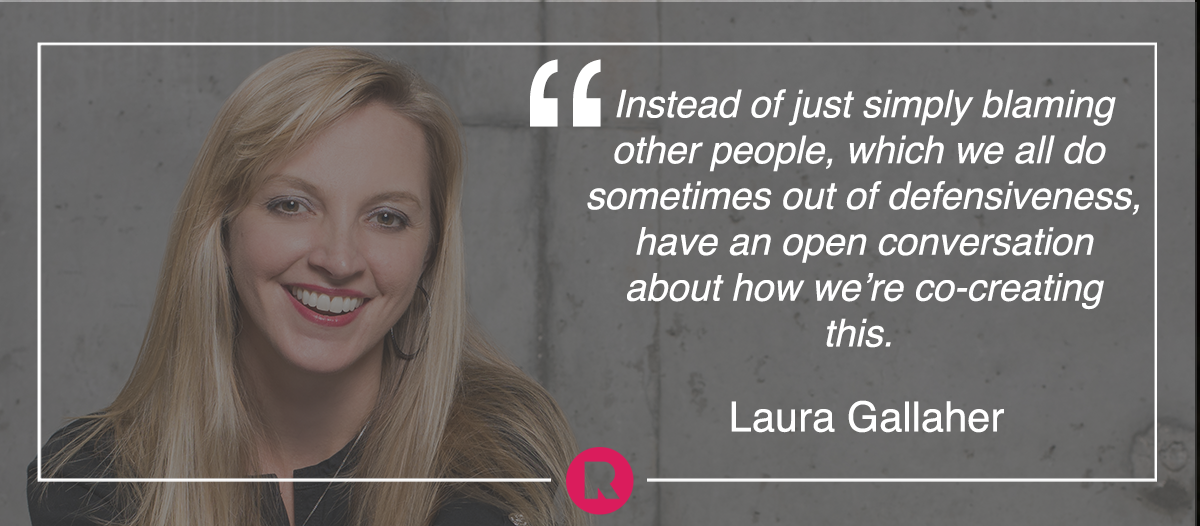
Dean: Is there a bit of irony there though? Because you know, I could see somebody who’s really proactive about those things, but maybe is very defensive as a leader and they think if they bring this [psychologist] person in, it’s good, but it will also really shine a light on certain things. So, it is kind of ironic that the people that maybe need you the most are the ones that are most resistant?
Laura: That actually breaks my heart. I think you’re absolutely right and that does happen all the time. I think I’ve gotten a lot better over the years of figuring out which leaders don’t really want my help. So one of the things that I tend to do early on in conversation is that I give that person feedback. I’ll give them positive feedback, too, but I give them feedback like, “I want to share something about how I’m experiencing you and how I think this is having an impact on me, maybe it’s having an impact on your team in the same way,” and I gauge how they respond to that because if their go-to is defensiveness, I usually give them one more shot. I just stay really present. I’ll say, “So I want to be open with how I’m experiencing you now, I’ve heard you say that you want my help, and yet as I give you feedback, I’m noticing that you feel more interested in defending yourself than learning from my perspective.” Then, I see if they respond differently, so I give them a couple of chances and if they’re still resistant, then I’m pretty straightforward and I say I’m not sure that I can help you.
Dean: I think that’s important, too. It’s like you get to sample the Deli meat at Publix. You know, you got the little taste, and then either you get it or you don’t.
Laura: [laughing] Yeah, totally.
Dean: So what common trait do you see with the effective leaders that you come in contact with?
Laura: I really think that it’s the pursuit of self-awareness that seems to make the biggest difference. Of course, I’m biased because I come in with that particular angle. Everybody has blind spots. Every single human has blind spots, I know I do, and so the more scared we are to hear about those things, the more we’re going to continue to get in our own way. So, I guess if I was to couple self-awareness with another key trait or characteristic, it’s going to be courage because this stuff gets really scary for people. I still feel a sense of fear and anxiety when I’m going into a situation where I know it’s going to push the bounds of my own self-awareness.
Dean: You mentioned the blind spots. Do you have any tips on how managers can become more aware of them because you don’t know, especially if you’re ignorant towards it? But, what are some tips on how they can become more aware of where their blind spots are?
Laura: Okay, so I had two immediate thoughts come to mind. Hopefully, they’ll both stay in there as I share the first one. So, the first one is to really ask for feedback in a specific way. I think a lot of leaders tell themselves, “Oh, I’m very open to feedback, I always ask my staff or my employees to let me know how I’m doing and what could be better.” That’s really broad and the vast majority of humans do still feel fear to have those kinds of conversations if the feedback is constructive. If the feedback is, “I’d like you to do something differently,” then we tend to feel a lot of fear in those conversations, so we avoid them.
So there’s a recognition that all situations are co-created.
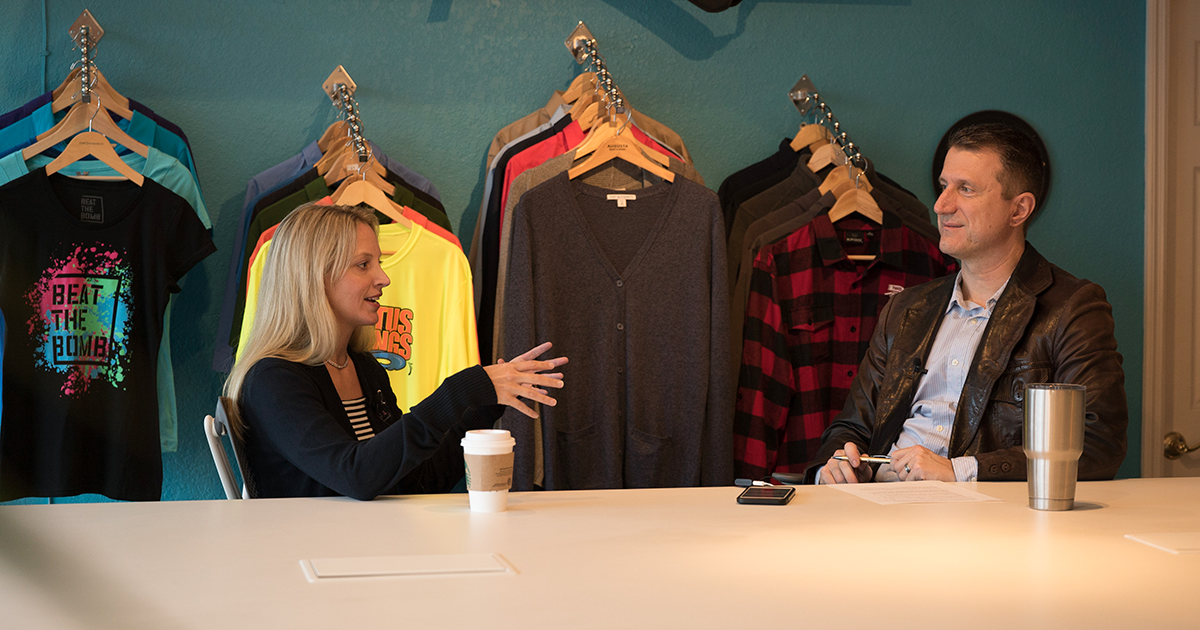 Dean: Can you give me a specific ask that would be in that same vein that you mentioned?
Dean: Can you give me a specific ask that would be in that same vein that you mentioned?
Laura: Yes, and so I think this is where the second piece starts to come in a little bit, which is that I want the leader to really understand that his or her actions are having a strong influence on the behavior of the people that they’re leading. So when they feel stuck or when they’re looking at the behavior of the team and they don’t like it, I want them to really think about in what way is my behavior affecting their behavior, and then that can become the frame for the specific ask. So, there’s a request the leader can make of the team at the same time that they then make an inquiry from the team to say, ” Hey, I noticed that I’m really looking for XYZ from you and what can I do to make that easier?” It could be things like, ‘I would really like us to be very proactive in reaching out to clients, which means don’t wait for them to call you. Please set your own schedule so you know when you’re going to reach out to them. Is there anything that we can do to make that easier?’ That way, you create space to have a conversation around it. Or, it might be something like, ‘Hey, I noticed that we were three months down this initiative before anybody told me that you didn’t like this idea.’ So maybe the feedback request is, ‘What can I do to make it easier for you all to raise your concerns sooner?’ The feedback becomes really, really specific and targeted for the leader. Instead of just, ‘How am I doing?’ it’s, ‘How am I contributing to your tendency to behave in this way?’ So there’s a recognition that all situations are co-created. Instead of just simply blaming other people, which we all do sometimes out of defensiveness, have an open conversation about how we’re co-creating this.
Dean: I would also put an asterisk next to it that we’re operating under the assumption that the leader is actually tracking the things that they want tracked and has actually expressed that it’s important.
Laura: Yes, which is so funny. You’re right, it can sometimes start so basic, like, ‘I didn’t even tell you that this is important to me’ or ‘I didn’t even tell you that I want this.’ We do make so many assumptions about the things that seem very common sense to us … I think you read my blog post that I wrote about that recently, but our tendency is to judge that because we’re so surprised by it, and we are just baffled by it. We have to recognize that others have a whole different perspective on life and so expressing that, and then making it common sense through conversations, is really helpful.
Dean: One term I’ve heard a lot in the last year and that I’ve thought a lot about is ‘hidden assumptions.’ I think that’s a really important point because sometimes we make assumptions, and we don’t realize we’re making assumptions, and then the issue or the problem stems from this assumption. So, I think it just all goes back to awareness.
Laura: Yeah, and stating the obvious. It’s almost like the more stupid you feel in stating something out loud, it’s probably the more important to say it because if it is a very shared belief, and yes, this assumption is valid, then great, it’s only going to take 5 seconds. And if not, holy cow, you might have just saved yourself so much time from problems down the road.
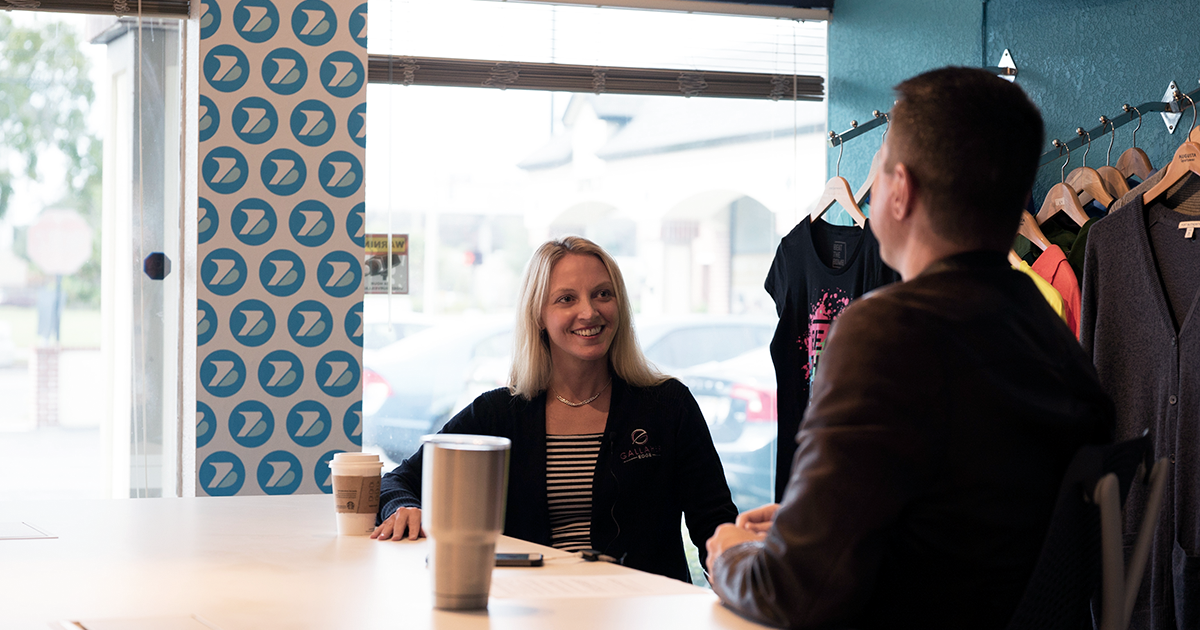
Dean: Who is the most effective leader that you’ve ever met in person?
Laura: I have two answers for this and the first one I want to say is somebody that I actually worked for personally. Her name is Stacie Phillips and she was my supervisor when I was internal at NASA. She was amazing. I’m pretty sure that every single one of us on the team that worked for her felt like we would just march off a cliff for her if that’s the direction she was leading us. Not that she would ever do that to the team, but she built incredible trust with us. She was incredibly open to feedback. She gave so much time to the employees, she created so much space for one-on-one dialogue … she gave feedback. She was not afraid to have the hard conversations, but I know I never doubted that she cared about me as a person and that she championed me as an employee. She was incredible.
…if we’re not A players, then we’re going to have conversations about that
Dean: Great mentor!
Laura: Yeah, she was amazing. I feel really, really grateful to have had her so early in my career. The other person is Barbara Stankowski, who is the CEO of AMTIS, Inc. I actually interviewed her last year for my show because she has a very specific philosophy on performance management. I think she’s incredible. So ANTIS has nearly doubled revenue in a matter of two years. Her organization has experienced incredible growth and she just she defies a lot of the assumptions that people make about how you have to work when you are in the business of contracting with the government. So, they don’t do any performance reviews, they don’t do any performance ratings. It’s about having open, real conversations and we perform as a team and we’re all A players and if we’re not A players, then we’re going to have conversations about that. So, the idea of like quotas and not everybody can be outstanding and there’s an annual review, she doesn’t do any of that but she’s still doing incredible things with her company. I think that’s the harder route to go, but it’s the far more effective route. She just has amazing answers and genuine experience to back it all up. When Disney hired me, they hired me to help them on that transformation of getting rid of performance ratings. Leaders fought it so hard. I love what she’s doing because it’s proving out and it’s working incredibly well for them.
Dean: What would you say to the Gen X-er like myself who grew up, you know, kind of being ingrained that vulnerability is a weak thing for leaders. I slowly changed my mind on this and became more vulnerable over time, but what would you say to the person that hasn’t changed their mind on that?
Laura: So, I had this really weird metaphor pop into my head, which is like imagine that you’re heading into some kind of physical fistfight and you show up wearing an armored suit for a knight. Do you seem strong at that moment or do you seem weak because you’ve chosen to put all of this armor on right?
Dean: It’s good defense.
Laura: That’s exactly what it is. It’s like I have to defend myself because I’m so weak. If I was truly strong, I wouldn’t need all the armor. And so to me, defensiveness, all of the manifestations of defensiveness – it is weakness, but we can overcome it. We can develop courage and I just so wholeheartedly believe that when somebody shows up with vulnerability, that takes incredible strength. So, I don’t know if that metaphor makes any sense.
Dean: I think it does because also in that suit, you’re rigid. You’re not very agile.
Laura: No, you are not agile at all. I think there’s a lot of other, I don’t know if they’re coming to me now, but other physical metaphors that are similar where actually the more vulnerable you put yourself, you know, doing a tightrope without a safety net, that’s far more vulnerable. Does somebody really want to say that person’s weaker?
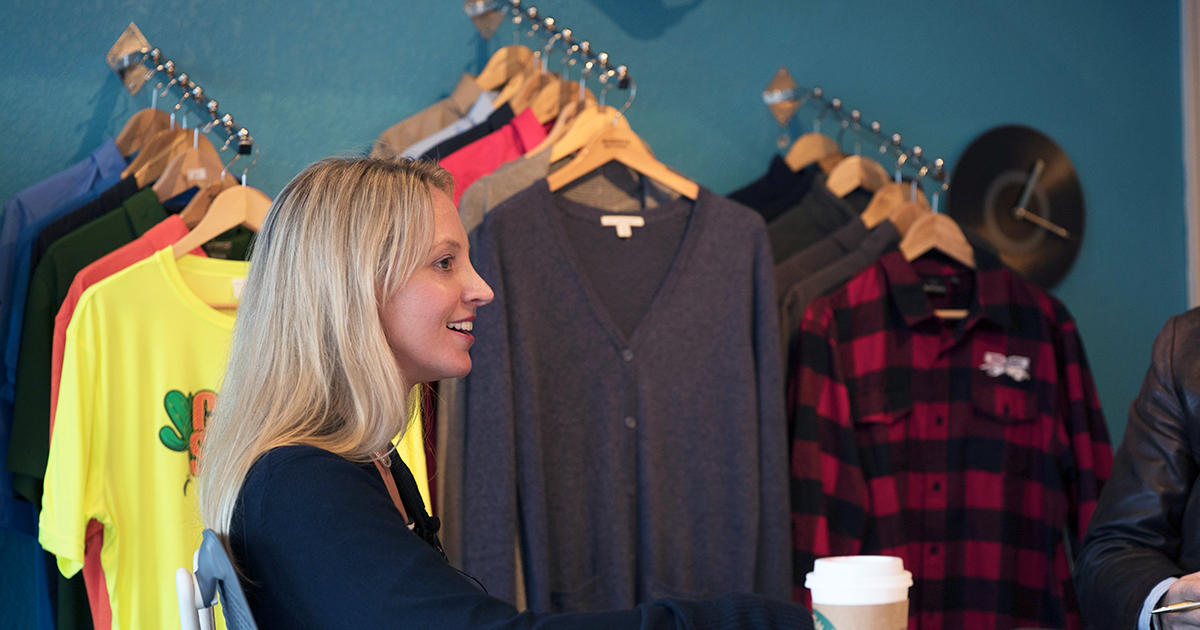
Dean: I know you help organizations in different ways and I know this is kind of a generality, but what would you say that organizations are really struggling with right now in 2018? That you’ve come into contact with.
Laura: I think change is one of the biggest things because change is so constant and it’s only getting faster and faster and faster. Recognizing what it takes to truly equip people inside an organization for that change, which honestly a lot of it does come back to vulnerability, I think because when things are constantly changing, that means that it’s going to be harder for us to predict. It means we’re going to have to take more risks and all those things are incredibly vulnerable. It takes a lot of courage to step into that space. I think leaders can really underestimate how much time is required to bring their team truly into alignment about the direction they’re going so that when change is coming they can pivot together.
‘Do you think that you are overanalyzing this?’
Dean: Do you think that, let’s call it the graying of Millennials, do you think that they …
Laura: Are we graying already? [laughs]
Dean: I’m actually supposedly part of the generation between Gen X and Millennials, but I identify as Gen X probably mostly due to my music taste, but do you think that change will be less of an issue with Millennials graying because they’ve grown up in a more fast-paced change technological world as opposed to the previous generation where change occurred more slowly over time? You know, I mean without going to the minutia of it because you just think about, you know, the smartphone revolution and how much time that took and I remember my dad mentioned in the seventies the first time he saw a fax and I think about how much time that took to get to the computer. So just curious, do you think that change will be less of a problem for the 50 and up Generation once millennials gray?
Laura: Definitely possible. That’s honestly something I haven’t given a ton of consideration to. I know that there are some very real components to the whole conversation around generations in the workplace.
Dean: Yes, all the time.
Laura: Yeah, my first thought was no because I think that in order to really prepare for change, it’s not even about oh, I’m used to change, it’s that for us to maintain effectiveness as an organization, we want to be changing together and moving in the same direction. But as you continued to speak, I thought yeah perhaps because they might just be more used to change that comes at them. I mean, it made me think about … so I’m somebody who when my phone wants to push an update, I stall. I wait, I wait, I wait because it feels like it always breaks things and then it takes them a few weeks … I’d like to think that it’s strategic, that I give it a few weeks and it’s constantly like, ‘Do you want to update?’ and I’m like, ‘No, thank you.’ I wait because they work out a lot of the bugs when the push comes out and then it breaks some of the apps or whatever, they work pretty hard to fix it and within a matter of three or four weeks, I tell myself that if I update later, they will have worked out the kinks already. So, some of us kind of take that approach, I don’t know if I’ve totally lost direction on that question, but yeah, I’m not sure.
Dean: So, when I wake up in the morning, many times I’m thinking about like Pantone colors or products and things like that and I can drive myself crazy. Good thing I’m passionate about what I do. I can tell you’re passionate about what you do because you are on 24/7 from what I can see. How do you not drive yourself crazy from getting in other people’s heads and then overanalyzing your own life?
I was just in Peru and flew in here yesterday…
Laura: I really like this question because it’s a constant practice for me. I’ve had several people ask me, ‘Do you think that you are overanalyzing this?’ You know, about like whatever, and the answer is: probably. One of the things that I believe about the whole journey and process of self-awareness is I believe that when we’re not aware of something, and something is a blind spot or we can’t figure out what’s driving our behavior in a certain way, I actually think that our brain feels we’re not ready to know yet. That’s been one of the ways that I practice letting something go and trusting that the answer will come to me when I’m ready for it. So, that’s not always the perfect immediate solution. There are definitely times where I can find myself ruminating, starting to get into obsessive thinking, but I notice it and it’s unpleasant, so I’ll go okay, It’ll come when it’s ready. So thinking about that as a subconscious choice that my brain is making for me has helped me almost just trust in the process and practice letting go.
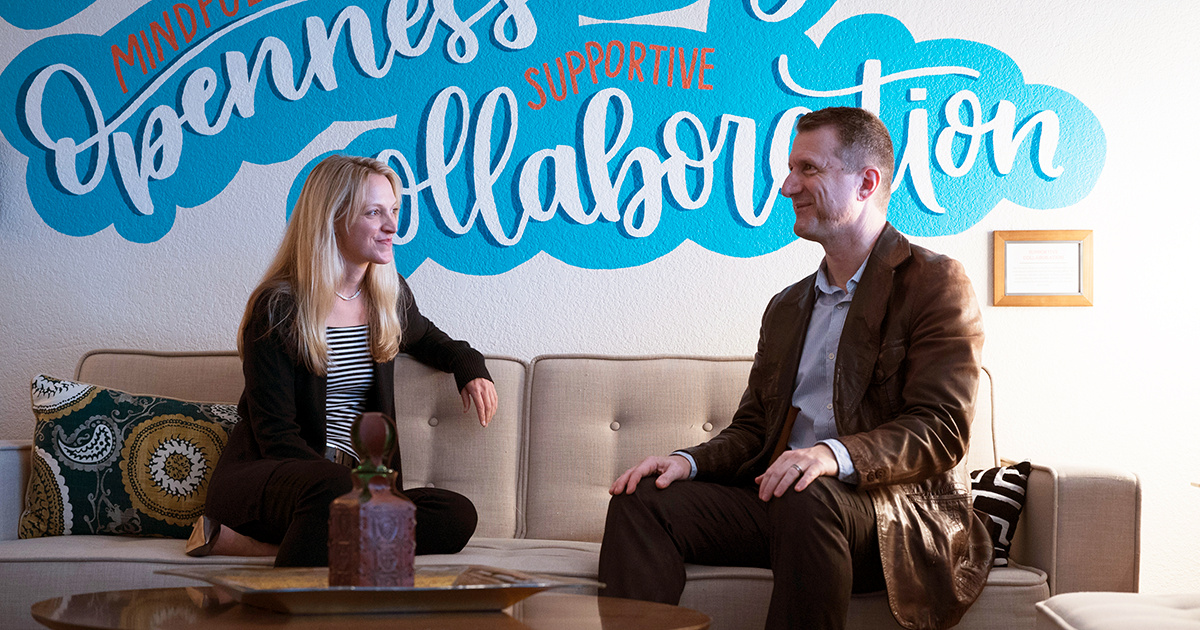
Dean: So when Laura disconnects, what do you do?
Laura: I think when I have the most success in disconnecting my brain, I’m doing something pretty physical. So as you know, I’ve been traveling a lot. I was just in Peru and flew in here yesterday, and I did so much cool shit in Peru. I went sandboarding in sand dunes. I didn’t even know that was a thing. And so when I’m sandboarding, I’m so focused on everything that my body’s doing, and I’ve only gone snowboarding twice, so I’m not good yet. So I’m really focused on what’s what I’m seeing, what I’m doing, what’s my body doing, what’s happening with the sand, and no part of me at that moment is like, ‘But what about how I’m showing up at work?’ I am just fully in that experience. Saturday of last week, I went repelling in a canyon, like I repelled 90 feet down a canyon. I was hyper-aware of what I was doing with the repelling and kicking off the wall and so for me, it’s a lot of physical activity. Usually, there’s some level of adrenaline rush or adrenaline-seeking in that activity, and yeah, no part of me get stuck in my brain on those days.
Dean: It’s a good reminder, you know, a healthy mind needs a healthy body. Distractions have many positive influences.
Laura: Totally. I’m a runner and when I run I can definitely be in my head thinking about stuff, so for me, it has to be something that’s sort of pushing my bounds physically, something that I haven’t necessarily done before where I feel like I really need to fully engage my brain and my body together in the activity that I’m doing and that’s been great.
Dean: So you mentioned your travels and you’re currently on a one year adventure living in a different country every month.
Laura: Yep, this is month nine.
Dean: I’ve done a bit of traveling in my life and I find that you always learn something when you travel. I want to know, you know, being this far into this journey traveling, what have you learned about yourself?
Laura: This is obviously something I’ve reflected on a lot because as you know, this is sort of my world. And the first thought that I have is I wonder if I find myself struggling to articulate anything truly profound because I’m still in the middle of it.
Dean: Quite possible. Sometimes, in the rearview mirror, things become very clear.
Laura: Yeah. I almost wonder what’s going to happen in terms of the growth in my awareness once the constant movement and the being international stops. I don’t have a huge, ‘Wow, that’s amazing’ kind of answer to this question yet and it’s actually one of the main reasons that I wanted to do this. I felt like if I keep myself in the same environment, if I’m not challenging myself or exposing myself to different parts of the world and different types of people, then I won’t even create the space for me to learn about myself. Without those certain challenges, I won’t know and so I really thought every month I’d be having these huge ‘aha’ moments and I think my best conclusion right now is that it’s so hard because I’m still doing it. So if anything, I could say … these don’t feel profound to me yet … but one is I think that we as humans, and what I’m finding for myself, we are far more capable of coping with things than we realize. So, in terms of like the living environment and the cities that I’m living in and the things that I do and don’t have in terms of material possession or access to whatever, it actually has only a minimal effect day-to-day. I’m still able to most of the time, you know, thrive with what I’m doing and so all the things we tell ourselves that we need in terms of the external world, and like possessions, feels completely false to me right now. Not that it’s not nice, like whenever I have a coffee maker in my apartment, I’m so excited, so that’s one.
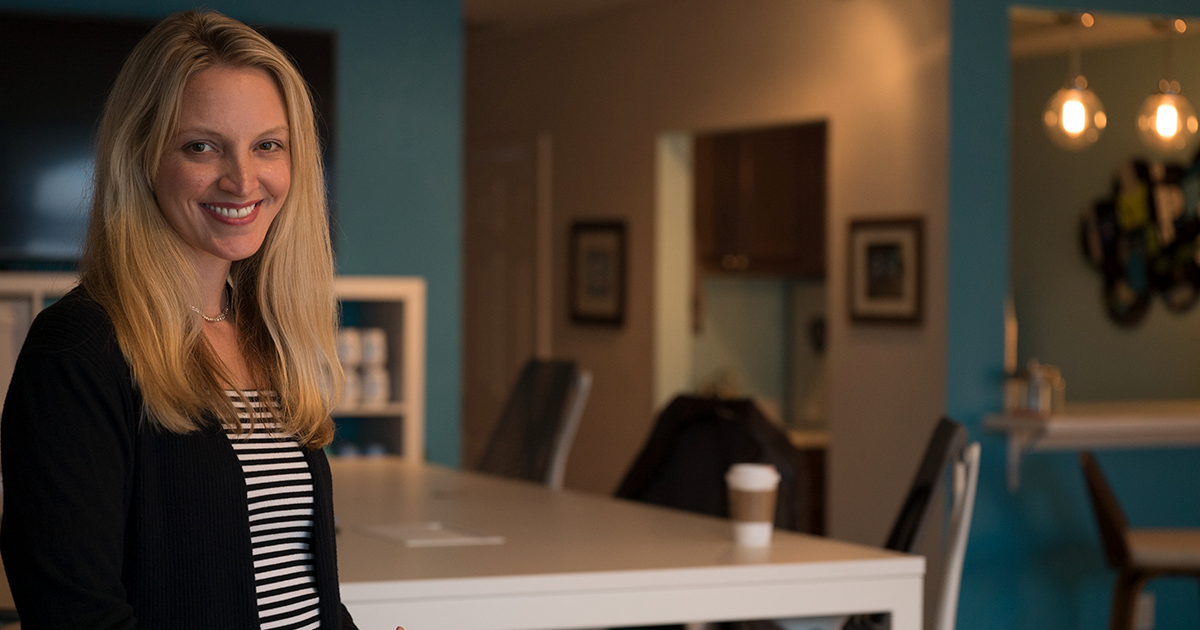
Dean: That’s true because if you have to adapt from country to country, maybe the amenities are different.
Laura: Oh, the amenities are always different. The other thing that’s starting to reach a level of profound for me, I think, is this idea of everything being temporary. So, every apartment that I’m in, every city that I’m in, I know I’m only there for a maximum of five weeks. It’s usually four, and so anything that I don’t love, I know it’s only for a few weeks. That immediately changes my confidence in my ability to cope. I’m like, well, it’s temporary, but the vast majority of things in life are temporary. That doesn’t mean just sit back and let it happen to you and take no action to make your life what you want it to be, but I feel like there’s something in that space about what changes about my general level of anxiety walking through the world when I tell myself that everything is temporary, which for me means both the high times and the low times, right? So joy is temporary, but so are moments of feeling incredible sadness or loneliness, everything is temporary. So, practicing gratitude for the things that are great and knowing that there are always things to be grateful for … I don’t know something in there. Maybe I’ll be profound in six months.
Home is not a place and it’s maybe not even the people …
Dean: I think it is profound because the temporary thing is really resonating with me. Something I’ve been thinking a lot about is how much maintenance is involved in life. Body, mind, relationships, things break, you know, it’s just maintenance.
Laura: Yeah. I like that. I think that’s an important connection because there are certain things that we humans tend to be pretty willing to do. I think pretty much most humans are willing to brush their teeth every day. Hopefully, multiple times a day, right? That’s boring as hell. Yeah. Nobody’s like, oh this is so exciting. This is amazing!
Dean: That’s why you say, ‘Alexa play the news’ or something.
Laura: Oh, I’m big into audio content, for sure. Yes, there’s a lot of things like that we find ourselves willing to do and then there are other things that we just sort of arbitrarily put into a category of, ‘I don’t really want to because it’s boring or it doesn’t excite me or something,’ but it could be in line with maintenance or even improving our lives somehow.
Dean: So, tomorrow you’re speaking at TedX. So, I want to put a link right here for your talk. Can you give us a small preview?
Laura: Yeah, absolutely. Well, there’s a bit of a preview I think in the name of it, which is, ‘It’s not the people or the place: How to feel at home anywhere.’ And so I make a case for this idea of home because that’s the theme for the event. Home is not a place and it’s maybe not even the people, but rather a choice that we make in terms of how we feel with ourselves as we walk through the world. So I could say more if you want, but that’s like my succinct preview of it.
Dean: That’s awesome. We will link it. So, I ask this question of everybody and it does require you to kind of look at things in the third person and get outside of your own skin looked at yourself, but what is your secret to being an outrageously remarkable psychologist?
Laura: I think for me it has to be that one of my core values is progress over perfection. So, one of the things that I notice I struggle with is, because I’m a psychologist and I’m constantly in the space of helping other people be more effective with people, sometimes I have the story in my head that I am meant to be some kind of superhero, but I’m still a human. Historically, I think I could get in my own way by ignoring my blind spots and halting my own journey of self-awareness because I just didn’t want to think that I was still not great at something in this space. But, the more I find that I’m willing to put myself out there, practice vulnerability, and share with the people even that are paying me to help them, here’s what’s happening for me right now. I used to think, ‘This is terrible, they’re going to think that I have no right to be telling them how they can be more effective because she doesn’t even have this stuff figured out,’ but actually it’s inspired so many perfectionists to actually step on this messy road with me and so I’d like to think that what makes me outrageously remarkable as an organizational psychologist is that I’m just in it with everybody else. I really don’t feel like I’m better, I feel like I am you. I feel like I project a ton when I coach and I’m usually right because I’m seeing the same kind of feeling that I know. I know that self-talk, I know that feeling, and that was hard for me in my mid-20s and somewhere right around turning 30, I really started to embrace like, you know what Laura, you are still human. A Ph.D. in Psychology does not overcome that so embrace it.
Dean: Thanks, Laura!
____________
Here is a link to Gallaher Edge’s website & follow Laura on Linkedin here.
Photos by Pat Daley, check out his work here. Thanks for coming by Blezoo to capture the interview!
Want to keep up with Dean’s blog? Subscribe here to be an insider